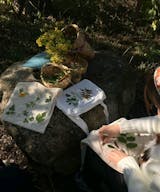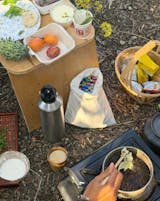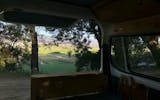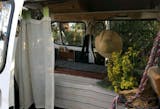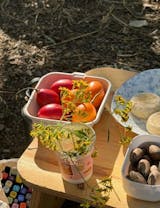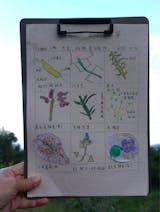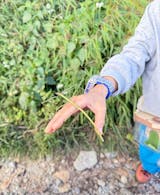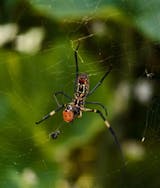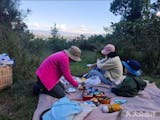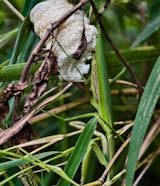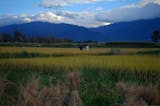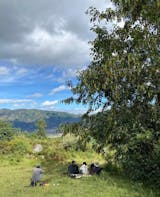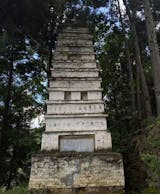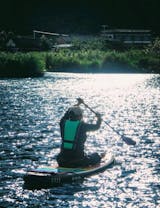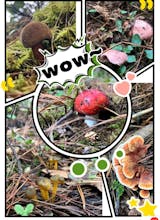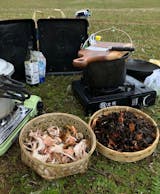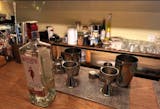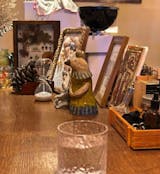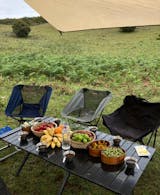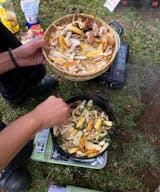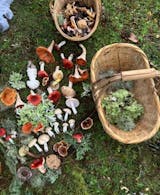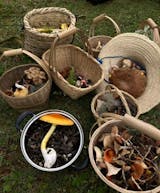
Liangzi | Jason's Ten Years in Dali
Yesterday I met with Jason for a chat
I feel sad that I have been in Dali for ten years.
Before Jason came to Dali, he opened an outdoor goods store in Shanghai. His first appearance in Dali was as the operator of a late-night canteen.
I still remember one night many years ago, my friend said he would take me to eat braised pork rice. We walked to Chengxinjing in the dark night, turned several turns, and somehow found ourselves in a small building, where we ate a bowl of braised pork rice.
It has been a long time, and I can no longer remember the taste, but I still remember my feelings at the time: This Shanghainese is so strange, why did he come to Dali to make braised pork rice? Why didn't he make it during the day, but in the dark night? Why are there such strange people and things in Dali? Why are they so strange yet fascinating?
Ten years later, the friends who ate the braised pork rice with me have long since scattered and lost contact, but the person who made the braised pork rice has become my long-term friend.
The first group of people who opened stores on Renmin Road had simple ideas. They wanted to stay and do something interesting. It would be best if they could make a small profit, but if not, that was fine too.
Dali is like a utopia, where young people can play house. The first generation of Renmin Road shop owners focused on having fun. No one wanted to get rich, and no one thought they could get rich.
Around 2011, Jason's late-night canteen officially opened in the middle section of Renmin Road, and soon after, my small grocery store also quietly opened in the middle section of Renmin Road. Every night after the grocery store closed at 9 o'clock, I would stroll to the late-night canteen and eat a bowl of beef brisket noodles, or fermented rice and egg custard, and sometimes a dish of braised tofu, and I ate it for several years.
If I hadn't gone to the late night canteen, I wouldn't have known that there were so many people who couldn't sleep at night. From 6 or 7 in the evening, people started eating, and until 4 in the morning, well-dressed people would quietly walk in and sit down to eat a plate of scallion oil noodles. They were not drunk or frustrated, but just wanted to have a bowl of hot rice before dawn.
In the beginning, the main force of the late-night canteen was Jason, with Xiaochun and Xiaohai helping out. Later, the tailor and Sister Hua also came. Together with the red fish and chips during the day, the small shop brought together a group of people in a lively and warm atmosphere.
During its heyday on Renmin Road in September, I don’t know how many late nights, after the music ended, the listeners and singers would walk into the late-night canteen to eat a bowl of noodles to comfort their loneliness.
When business is busy, Jason and his partners show their talents in the small kitchen. Garlic seafood fried noodles, beef brisket rice and beef brisket noodles, scallion oil noodles, rice dumplings with fermented rice, etc., are constantly produced... At this time, I can't help at all, so I will help wash the dishes, acting as a temporary dishwasher, quickly washing the cups, plates and bowls piled in the sink. If you often went to the late-night canteen to eat in those years, you might have used the dishes I washed.
The narrow old tile-roofed house was filled with people sitting cross-legged even in the attic. The waiters and customers were shoulder to shoulder, feet to feet, huddled together happily, grateful that someone cooked hot food for them at night. On a snowy winter night, the gods in the distance were not as important as a bowl of hot noodle soup in front of you.
Whether it is the old Dali or the new Dali, they are all people who have taken root in Dali again. The atmosphere created by Jason in the late night canteen will make strangers feel the kindness and cordiality, you are not alone.

I have seen a sad and frustrated woman walk into the late night cafeteria and cry on Jason's shoulder. He was cooking rice or noodles in the kitchen at the time, and he did not stop the spatula in his hand, nor did he stop the woman from crying on his shoulder. I sat in the corner and witnessed that scene. Jason did not say anything, but I felt that his body language was telling the crying woman next to him: If you feel sad, you can cry, but you can't stop your hands, and life must go on.
I spent my 26th and 27th birthdays in the late night canteen. My birthday corresponds to the rainy season in Dali, with heavy rain falling day and night. When people living in old houses meet, they always joke with each other, "How is the leak in your house? Are there enough pots and pans to catch the rainwater?"
The tile roof of the late night restaurant was also leaking. It was raining heavily outside and drizzling inside. We sang birthday songs, blew out candles, cut cakes, and spent our birthdays in a foreign land after growing up. I distributed the cakes to customers in the store, and everyone got a share. Everything was up to fate. Strangers wished me a bright future and happiness in the world.
The rent of the old tile house rose from 25,000 to 50,000, and then the rent of the surrounding shops rose to more than 100,000 or 200,000. It was meaningless to continue. Jason chose to move the late night canteen to Yincang Road. Just like before, it was small and quiet, cooking hot food in the middle of the night for the people who were not sleeping.
In the era of soaring rents, interesting shops on Renmin Road gradually disappeared. Some people chose to leave Dali and return to the city. Some people chose to buy houses in Dali and invest in this town. Waves of people came to Dali with yearning and longing, replenishing the infinite vitality of this small town in western Yunnan.
It is inappropriate to complain that Dali has changed. Everything in the world is changing. Positive people are always positive and constantly adjust themselves, just like surfing, floating up and down, always on the waves. The complaining people are still crying over the spilled milk, while the optimistic people have already crossed over to a more beautiful scenery.
After the relocation, the late-night restaurant was gradually able to be unblocked. Jason began to return to what he loved to do, hiking in the mountains, listening to the sound of pine trees in the bamboo forest, watching the moon rise and set, taking his two dogs upstream along the stream, and camping overnight next to an unknown wild hot spring.
Jason and his friends have traveled all over the 19 peaks and 18 streams of Cangshan Mountain, looking for the hidden and beautiful corners between Cangshan and Erhai Lake. They have discovered several classic routes and brought people who are also interested in hiking together, which can be easily completed by ordinary people. I have changed my prejudice that hiking requires carrying a large bag and heavy loads, which is unbearable. It turns out that walking between Cangshan Mountain and Erhai Lake is such a relaxing and wonderful experience.


Many friends from other places have asked me before, if they don't want to take the cable car or climb the peak, but just want to walk around in Cangshan Mountain and see the flowers and plants, how can they do it? This was also a difficult problem for me in the past. Thanks to Jason for presenting the answers to these questions in detail, so that many people like me who are not physically strong enough can satisfy their desire to walk around in Cangshan Mountain.
—— Jason’s Cangshan and Erhai Lake hiking and camping route——
Walking the Ancient Tea-Horse Road, the Nanzhao Ruins overlooking the sunset at Erhai Lake
Go to Cangshan Mountain to pick mushrooms and visit Wuwei Temple. After going down the mountain, drink mushroom chicken soup
Cross Mocan Creek to see Erhai Lake and go to a hidden temple in the mountains to have a vegetarian meal
Cycling through the fields by the Erhai Lake and eating home-cooked meals after sunset
......
For more experience routes, you can follow Jason’s official account, or search for “Cangshan Hiking Home” on Dianping.com. The routes have detailed text descriptions and real pictures.
The people leading the team are still the former late-night canteen crew, Jason, Honghong, the tailor, and the two puppies, Nuomi and Harry.
The spirit of mutual assistance and friendship of Lao Dali has been passed on, which is particularly reflected in Jason. Mao Jie, who is also Lao Dali, previously opened a Mao San Coffee Shop near Chengxinjing, but encountered the dilemma of closing the business because her business partner violated the contract.
At that time, Mao Jie was in poor health and was resting in her hometown, so she was unable to come to deal with this troublesome matter. Our always warm and loving Jason stepped forward in time and united a group of warm-hearted and capable friends to help and perfectly solve the relocation of Mao San Cafe.
We encountered many practical difficulties throughout the process, but with the help of everyone, the new Maosan Cafe was reborn like a rebirth, and it was exceptionally beautiful.
The concept of the Mao San Cafe Community Canteen was first proposed by Hong Hong and implemented by Jason. It has been running well since August. Once or twice a week, good friends come to cook daily meals from their hometowns. They are simple and plain, and the price is affordable. The scale of each time is about 20 to 30 people. Part of the income is donated to the cafe. Thank you Sister Mao for providing the venue for everyone.
Old friends gathered in Mao San's courtyard for lunch, chatting, basking in the sun, and drinking coffee. It seemed like time had returned to 2010, forever young and full of tears.

Jason's ten years in Dali also represent a group of people like us, who came from the ends of the earth to the small town under the Cangshan Mountain, using their enthusiasm to warm the land here, plant the seeds of love, and bloom the flowers of kindness.
Some people come and go
Some people leave and come back
Jason is always here
Like me




